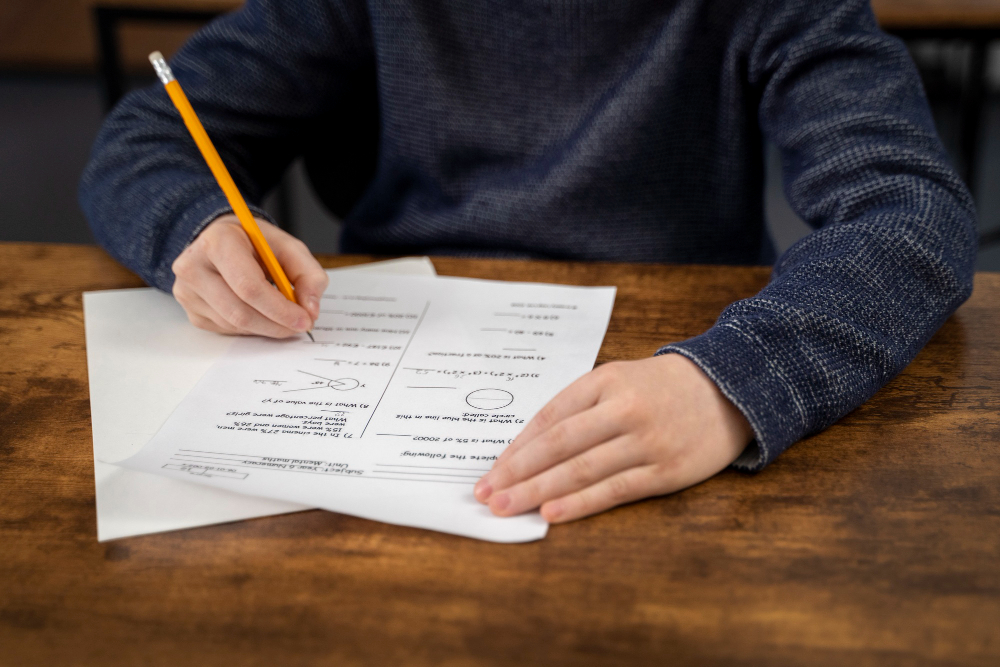Image by jannoon028 on Freepik
Are you aiming for a high SAT score?
Whether you dream of getting into your top-choice university or competing for prestigious scholarships, achieving a perfect score can be a game-changer.
This practical guide will walk you through everything you need to know about SAT scores, from understanding what constitutes a good score to providing actionable strategies for reaching that coveted perfect 1600.
Read on to discover expert tips, proven study methods, and insider knowledge that could help you get the SAT score of your dreams.

What is Considered a Good SAT Score?
Before diving into how to get a perfect SAT score, it’s essential to understand what constitutes a good score.
The SAT is scored on a scale of 400-1600, with 1600 being the perfect score. But what’s considered “good” can vary depending on your goals and target schools.
The average SAT score typically hovers around 1050-1060.
However, for highly selective colleges, a “good” score might be 1400 or above. It’s crucial to research the average SAT scores for the colleges you’re interested in to set realistic goals for yourself.
Breaking Down SAT Sections
Understanding the structure of the SAT is crucial for achieving a high SAT score. The test is divided into two main sections: Evidence-Based Reading and Writing (EBRW) and Math.
Let’s take a closer look at each of these sections.
Evidence-Based Reading and Writing (EBRW)
The EBRW section of the SAT consists of two tests: Reading and Writing & Language.
This section aims to assess your ability to comprehend and analyze written material, as well as your command of English grammar and usage.
1. Reading Test:
-52 questions to be completed in 65 minutes
-Focuses on reading comprehension and analysis
-Includes passages from literature, social sciences, and natural sciences
-Questions may ask you to interpret information, analyze arguments, and make inferences
2. Writing & Language Test:
-44 questions to be completed in 35 minutes
-Tests your ability to identify and correct errors in grammar, punctuation, and sentence structure
-Also assesses your ability to improve the effectiveness of written expression

Image by Freepik
Math
The Math section of the SAT is designed to test your mathematical reasoning skills and your ability to apply math concepts to solve problems. It’s divided into two subsections:
1. No-Calculator Section:
– 20 questions to be completed in 25 minutes
– Tests your ability to solve problems without the aid of a calculator
2. Calculator Section:
– 38 questions to be completed in 55 minutes
– Allows the use of an approved calculator
The Math section covers four main areas:
– Heart of Algebra (linear equations, systems of equations, and inequalities)
– Problem Solving and Data Analysis (ratios, percentages, and interpreting data)
– Passport to Advanced Math (quadratic and higher-order equations)
– Additional Topics in Math (geometry, trigonometry, and complex numbers)
To improve your Math score:
– Review fundamental math concepts and formulas
– Practice solving problems both with and without a calculator
– Focus on understanding the underlying concepts rather than just memorizing procedures
– Work on improving your speed and accuracy through regular practice
How Can I Improve My Score?
Improving your SAT score requires dedication, strategic planning, and consistent effort.
Here are some effective ways:
1. Take practice tests regularly: Full-length practice tests familiarize you with the format of the test and help identify your strengths and weaknesses.
2. Analyze your mistakes: After each practice test, thoroughly review your incorrect answers to understand why you got them wrong.
3. Use official SAT materials: The College Board offers free official SAT practice tests and resources that accurately reflect the real exam.
4. Consider SAT prep courses or tutoring: If you need additional support, SAT prep classes or one-on-one tutoring can provide personalized guidance.
5. Focus on your weak areas: Dedicate more study time to the sections or types of questions you struggle with most.

Image by user18526052 on Freepik
What’s the Best Way to Study for the SAT?
Developing an effective study schedule is crucial for SAT success.
Here’s how to create a study plan to follow before you take the test:
1. Start early: Begin your prep at least 3-6 months before your test date.
2. Set specific goals: Define what score you’re aiming for and break it down into smaller, achievable milestones.
3. Create a consistent study routine: Dedicate regular time slots for practice tests, aiming for at least 1-2 hours per day.
4. Use varied study materials: Combine official SAT practice tests with prep books, and online resources like the free SAT prep program from Khan Academy.
5. Take breaks: Avoid burnout by incorporating short breaks into your study sessions and rewarding yourself for reaching milestones.
How Many Times Can I Take the SAT?
Many students take the SAT multiple times to achieve their desired score.
- Most colleges allow you to take the SAT up to 3 times without penalty.
- Some students see significant improvements in their scores after retaking the test.
- Consider taking the PSAT in your junior year as a practice run.
- Plan to take the test at least twice, leaving room for improvement and unexpected circumstances.
Remember, while retaking the test can be beneficial, there’s a point of diminishing returns.
Focus on quality preparation rather than countless retakes.
What Should I Do on Test Day to Maximize My Score?
Your performance on test day can significantly impact your SAT score. Follow these tips to ensure you’re at your best:
1. Get a good night’s sleep before the test.
2. Eat a nutritious breakfast to fuel your brain, add in some fresh fruits.
3. Arrive at the test center early to avoid last-minute stress.
4. Bring all necessary materials, including your admission ticket, ID, and approved calculator.
5. Stay calm and focused throughout the test, using deep breathing techniques if you feel anxious.
How Can I Improve My Time Management During the SAT?
Time pressure is a common challenge for many test-takers. Here are strategies to improve your pacing:
1. Practice with timed sections regularly.
2. Learn to quickly identify question types and apply appropriate test-taking strategies.
3. Don’t spend too much time on any single question; mark difficult ones and return to them later if time allows.
4. Use the process of elimination to narrow down answer choices quickly.
5. Develop a rhythm for each section, allocating a specific amount of time per question.
What’s the Secret to Getting a Perfect 1600 on the SAT?
While there’s no guaranteed formula for a perfect 1600 SAT score, these strategies can help you get closer to that goal:
1. Master the content: Ensure you have a deep understanding of all topics covered on the SAT.
2. Practice extensively: Take multiple full-length practice tests under realistic conditions.
3. Learn from your mistakes: Analyze every incorrect answer to prevent similar errors in the future.
4. Develop strong test-taking strategies: Learn techniques for each question type and section.
5. Stay motivated: Set intermediate goals and celebrate your progress along the way.
How Does the Digital SAT Differ from the Paper Version?
With the introduction of the digital SAT, it’s important to understand the differences:
1. The digital SAT is shorter, lasting about 2 hours instead of 3.
2. It’s adaptive, meaning the difficulty of questions changes based on your performance.
3. The scoring scale remains the same (400-1600).
4. You’ll use a secure testing application on a personal or school-provided device.
5. Results are available more quickly, often within days instead of weeks.
Familiarize yourself with the digital format through official College Board resources and practice tests.
What Role Do SAT Scores Play in College Admissions?
While important, SAT scores are just one part of your college application. Here’s what you need to know:
1. Many colleges use a holistic admissions process, considering factors beyond test scores.
2. Some schools have adopted test-optional policies, making SAT submissions voluntary.
3. A high SAT score can strengthen your application, especially if other parts of your academic record are less strong.
4. SAT scores may be used for scholarship considerations, even at test-optional schools.
5. Research each college’s specific policies regarding standardized test scores.
How Can I Stay Motivated Throughout My SAT Prep Journey?
Maintaining motivation during long-term SAT preparation can be challenging. Try these strategies:
1. Set small, achievable goals and reward yourself for reaching them.
2. Study with friends or join an SAT preparatory group for mutual support and accountability.
3. Visualize your success and the opportunities a high SAT score could open up for you.
4. Take care of your physical and mental health through regular exercise, healthy eating, and stress-management techniques.
5. Remember that your score doesn’t define you – it’s just one step in your educational journey.
Takeaways
In conclusion, achieving a high SAT score, or even a perfect 1600, is within reach with the right preparation, strategies, and mindset.
By following the tips mentioned above and maintaining dedication to your goals, you can significantly improve your score and open doors to exciting educational opportunities.
Good luck on your SAT journey!




